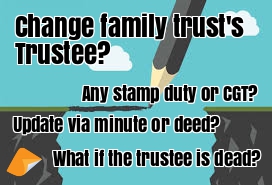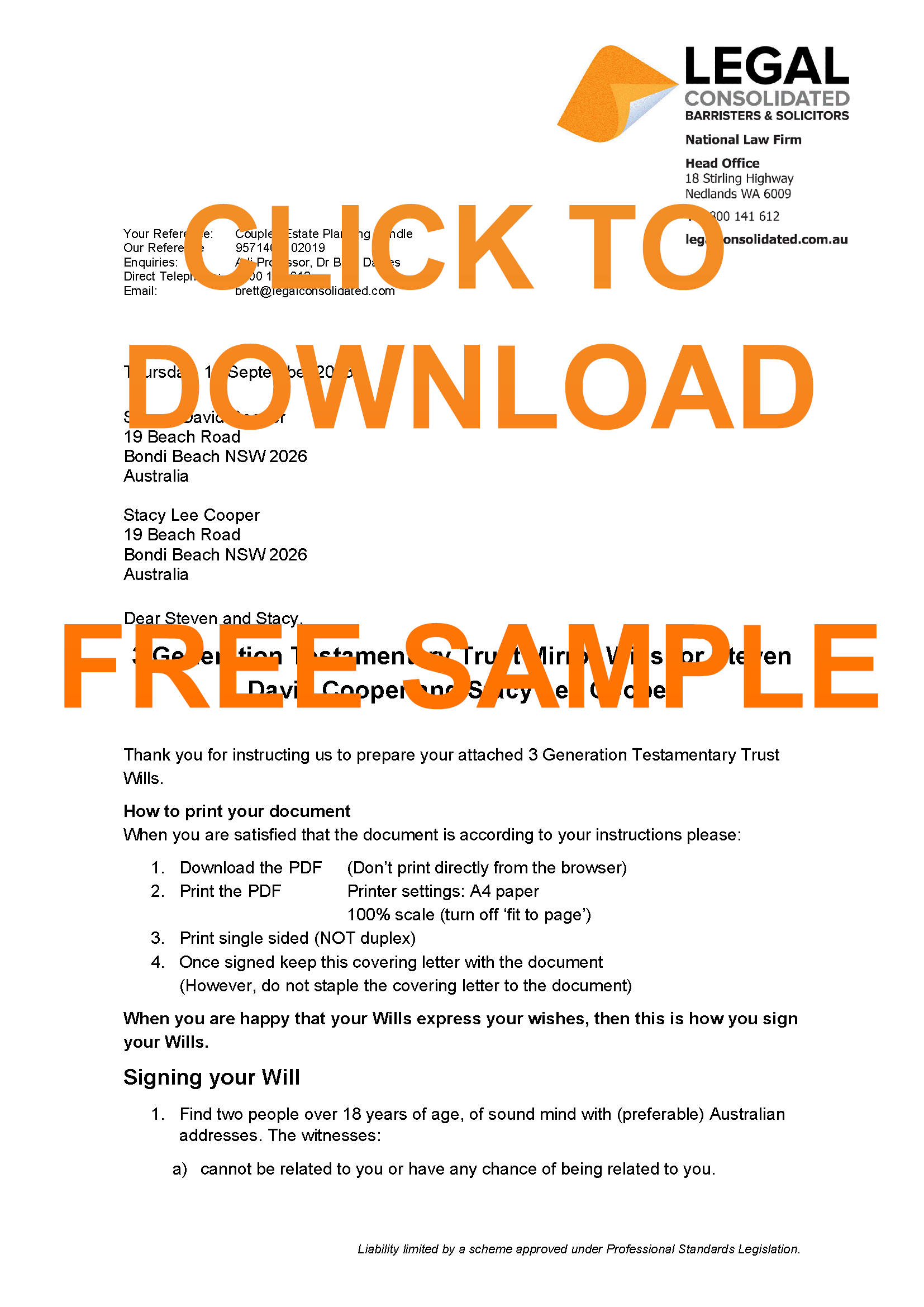Update the trustee of your Family Trust
In this Deed of Variation, you are cleaning up who the Trustees are in your Trust. You are changing the Trustees to suit your needs.
- A Trustee may be dead or retiring: ‘leaving‘
- A Trustee may decide to remain as a Trustee. The Trustee continues to be a Trustee: ‘remaining‘
- A Trustee may be coming on as a new Trustee: ‘new‘
For example, change the trustee of your Family Trust:
Mum wants to stop being the trustee of her Family Trust
Mum and Dad met with their adviser to discuss asset protection. Their adviser explains that there is a risk in being a Trustee of a trust. If the trust becomes insolvent, the Trustee or Trustees are often liable for the trust’s debts.
Mum and Dad already follow the ‘mother of substance and man of straw‘ asset protection strategy:
- Mum has all the good assets (family home, investment properties, shares, cash) in her name.
- Dad has no assets in his name. (Commonly, doctors, financial advisers, lawyers, engineers, accountants, etc, as they give advice, rarely have assets in their own name.)
So it makes sense to remove Mum as a Trustee of this trust. In that instance:
- Trustee leaving: Mum
- Trustee remaining: Dad
- Trustee new: leave blank and answer ‘No’
Dad wants to stop being the trustee of his Family Trust, as the Family Trust is now running a business
Dad is the sole trustee of his Family Trust. He operates a property construction business through the trust. It (like all businesses) faces a high risk of insolvency. If the Family Trust becomes insolvent, the Trustee often also becomes bankrupt. Trustees often go down with the sinking ship.
Therefore, Dad decides to resign as the Trustee of the trust. Instead, he puts a company in as the Trustee. (This is called a ‘corporate trustee‘.) Therefore:
- Trustee leaving: Dad
- Trustee remaining: leave blank and press ‘No’
- Trust new: Company as trustee of a Family Trust
Dad, as the trustee of his Family Trust, dies
Mum and Dad operate a Family Trust. It just holds shares. It is, therefore, at no risk of going insolvent. There are no asset protection issues with this trust. Mum and Dad remain the Trustees. Sadly, Dad dies. Mum is happy to remain as the sole Trustee. In that instance:
- Trustee leaving: dead Dad
- Trustee remaining: Mum
- Trustee new: Trustee: leave blank and answer ‘No’
Mum and Dad, as the trustees of their Family Trust, both die
Mum and Dad die in an aeroplane crash. Their three children now control the Trust as the backup Appointors. The children do not want to be trustees themselves. Instead, they build a new company to be the corporate trustee of the family trust. In that instance:
- Trustee leaving: Dad and Mum
- Trustee remaining: leave blank and press ‘No’
- Trustee new: Company
Replace the trustee of your Family Trust when:
- Trustee retires
- Appointors sack a Trustee
- Go from a corporate Trustee to a human trustee
- Go from human to a corporate Trustee (company as trustee)
- Want a single Trustee only
- Trustee dead, gone bankrupt or insolvent
How many trustees should my Family Trust have?
From an asset protection perspective, having one Trustee is best. The Trustee is an at-risk person. What happens if the Family Trust goes insolvent? The Trustee often goes down with the Family Trust.
Further, for added asset protection, make the new Trustee of your Discretionary Trust a company. Build a Corporate Trustee company for a Family Trust.
Any stamp duty or CGT to change a trustee of a Family Trust?
Does your Family Trust own bank accounts, shares and real estate? Transfer these from the old to the new Trustee. For the land transfer, you need to have it ‘stamped’ before you can lodge it at the titles office. There is generally no stamp duty (State law) or Capital Gains Tax (Commonwealth law). This is when assets are transferred from one trustee to another. This is especially true if you use our Deed. However, NSW and ACT may apply stamp duty if you are not careful. See here. This is on the real estate transfer from the old trustee to the new trustee.
Intellectual Property, which is assigned to the Trust, remains the property of the Trust. Just because you change the (puppet) trustee of the Family Trust does not change the beneficial ownership. You may, however, need to update the legal owner of the IP. However, you should consult with an IP lawyer. We do not practice in that area of law.
Victorian Stamp Duty when you update a trustee of a Family Trust?
We do not advise on stamp duty. This information is only general advice. Under Section 33(2) Duties Act 2000 (Victoria), no stamp duty is charged to a:
- special trustee (i.e. Special Purpose Company, such as a Self-Managed Super Fund update trustee);
- or new trustee of a Family Trust or a Unit Trust
However, you must overcome some hurdles to avoid paying stamp duty. See section 33(3) and s33(5) Duties Act 2000 (Vic). Stamp duty is charged. This is unless the Victorian Commissioner of State Revenue is satisfied that:
- none of the continuing trustees remaining after the retirement of the old trustee are beneficiaries under the family trust, and
- the new trustee is not a beneficiary under the family trust and
- this is not a scheme to change the beneficial ownership of the assets
The Victorians’ interpretation of this section is here. What if you fail on one of the above? What if none of the three are satisfied? Then, the change of a trustee is chargeable with stamp duty under section 33(4) of the Duties Act 2000 (Vic).
NSW Stamp Duty when you change the trustee of a Family Trust?
See here, NSW transfer (stamp) duty on the change of a trustee of a Family Trust.
CGT on a change of a Family Trust trustee
We do not advise on this. Seek your own advice. However, Capital Gains Tax (CGT) is not generally payable in Australia for updating a Family Trust Trustee.
‘Register’ the Deed of Variation to change the trustee of your Family Trust?
An advantage of Family Trusts over companies is that Family Trusts are mostly unregulated. Companies are over-regulated. You don’t need to lodge your Family Trust or any Deeds of Variation anywhere. However, you do keep a complete set of the originals in safe custody and with your accountant. This is for both the Family Trust Deed and all Deeds of Variation.
Have a look at the Sample document, and there are many training videos and hints to help you as you build the Family Trust update of the Trustee.
Do you update a trustee of a Family Trust via a “Deed” or a “Minute”?
Sometimes, a Family Trust Deed is amended via a Minute. That does not work.
Also, updating a trustee of a Family Trust via a Minute does not work.
Minutes to change a Family Trust trustee do not work
Advanced Holdings Pty Limited, as trustee for The Demian Trust, v FCT [2020] FCA 1479 demonstrates the importance of having a legally prepared Deed to update a trustee of a Family Trust.
In Advance Holdings Pty Ltd, there is a Minute of a ‘Notice of Removal of Trustee’. A director of the trustee company signs it, but it is merely a minute—it is not a deed. The Court declared the Minute to remove the Family Trust trustee invalid.
The failed ‘Deed of Retirement and Appointment of Trustee’ minute refers to a previous minute.
The court states that the Minute and the previous Minute are ineffective in removing the Trustee from the Family Trust.
The Appeal: Advanced Holdings Pty Limited atf The Demian Trust v FCT [2021] FCAFC 135.
Generally, a court enforces an objective intention. This is where the words of an instrument show that intent. However, the court cannot give effect to any intention that is not expressed or plainly implied in the document’s language. Minutes are not Deeds. Minutes merely record what a Deed has done. Minutes sadly produce
‘gratuitous, groundless, fanciful implications’.
See also Fell v Fell [1922] HCA 55.
-
- A Family Trust is created via a Deed. A Deed must update it.
- A change of a trustee in a Family Trust should be updated via a Deed of Variation to Change a Trustee.
Build a new Family Trust Deed or update the old Family Trust to change the Trustee?
Q: I need to change the Trustee of my Family Trust, but I notice that the Deed to Change the Trustee is more expensive than a new Family Trust Deed. Can I build a new Family Trust Deed, instead?
A: Do not build a new Family Trust deed, as it causes a resettlement. Building a “new” Family Trust Deed does not fix your old trust. It just creates a second, empty trust.
If you move assets from your old trust to your new trust, you trigger a “resettlement.” A resettlement is a catastrophic tax event. The Australian Taxation Office and State Revenue Offices treat this transfer as a full sale and disposal of all trust assets.
You trigger stamp duty on all dutiable assets (like land). You trigger Capital Gains Tax (CGT) on all assets that have grown in value (like shares and property).
The Federal Court in Commissioner of Taxation v Clark (2011) 190 FCR 206 confirmed that fundamental changes to a trust (such as moving all assets to a new trust) end the original trust. This triggers these tax events.
The correct method is to update your existing Family Trust.
Changing from mum and dad to a corporate trustee of the Family Trust
Q: The Legal Consolidated company is intended to become the Trustee for an existing Discretionary Family Trust.
The Family Trust operates under a registered business name. The Family Trust sells products and services. It has an ABN and TFN and two Individuals as Trustees.
A: Having two humans as trustees of a trading Family Trust is an asset protection disaster. All trading vehicles and professionals are at high risk of insolvency. At worst, you should have only one human at risk as trustee of a Family Trust. And it is better to have no humans. You moving to a company as your trustee is long overdue.
Building this document updates the trustees of the Family Trust. (You may wish to upgrade the Family Trust deed as well.) It takes about 14 minutes to build this Deed of Variation. Once it is signed, it changes the trustee immediately.
However, you will now need to transfer all the assets from the old trustee (your parents) into your new company’s name.
When you change the trustee of a Family Trust, do you change the ABN and TFN?
It is the Family Trust that is doing the business. Not the trustee of the Family Trust. A corporate trustee of the Family Trust usually has neither an ABN nor a TFN. It does not do tax returns. The corporate trustee does not trade in its own name. The corporate trustee owns no assets beneficially. However, speak to your accountant. We are not giving legal advice.
The Family Trust trades. The Family Trust owns the assets.
Instead, the Family Trust has the ABN and TFN and is registered for GST.
A change in a trustee of a Family Trust does not alter this.
How does the new trustee sign on behalf of the Family Trust?
For humans:
- Dad Full Name as trustee of the Trust Name ABN 38383838382
Colin Jefferies Smith as trustee for the Smith Family Trust ABN 38383838382
For a company:
- Company Name Pty Ltd ACN 123456789 as trustee for the Trust Name ABN 38383838382
Computer Science Nominees Pty Ltd ACN 383837383 as trustee for the Smith Family Trust ABN 38383838382
Who contracts with the client? The Trustee or the Family Trust?
Q: We are going to assign Intellectual Property to a client. Who is the assignor? Is it the Corporate Trustee or the trust?
A: It is always the trust. However, the trust operates through a trustee. The trustee is either a company (Corporate Trustee) or a human (Human Trustee). So it is either:
- Coopy Pty Ltd atf the Smith Family Trust; or
- John Smith atf the Smith Family Trust
The expression ‘atf’ is short for ‘as trustee for’
If you change the trustee of your family trust again in years to come, the new trustee will be ‘as trustee for’ the Smith Family Trust.
See also
Changing ‘trustees’ and ‘controllers’ Tool Kit
Family trust – changing control without tax
- Family Trust Deed – watch the free training course
- Family Trust Updates:
- Everything – Appointor, Trustee & Deed Update
- Deed ONLY – only update the Deed for tax
- Guardian and Appointor – only update the Guardian & Appointor
- Change the Trustee – change human Trustees and Company Trustees
- The company as Trustee of Family Trust – only for asset protection?
- Bucket Company for Family Trust – tax advantages of a corporate beneficiary
Unit trust – the voting rights are in the Units
- Unit Trust
- Unit Trust Vesting Deed – wind up your Unit Trust
- Change Unit Trust Trustee – replace the trustee of your Unit Trust
- Company as Trustee of Unit Trust – how to build a company designed to be a trustee of a Unit Trust
Partnerships and Companies can be upgraded with no tax implications
- Partnership Agreement – but what about joint liability?
- Incorporate an Australian Company – best practice with the Constitution
- Upgrade the old Company Constitution – this is why
- Replace lost Company Constitution – about to get an ATO Audit?
Do Service Trusts have any value when you retire or die?
- Independent Contractor Agreement – make sure the person is NOT an employee
- Service Trust Agreement – operate a second business to move income and wealth
- Law firm Service Trust Agreement – how a law firm runs the backend of its practice
- Medical Doctor Service Trust Agreement – complies with all State rules, including New South Wales & ACT
- Dentist Service Trust Agreement – how dentists move income to their family
- Engineering Service Trust Agreement – commonly, engineers set up the wrong structure
- Accountants Service Trust Agreement – complies with ATO’s new view on the Phillips case

